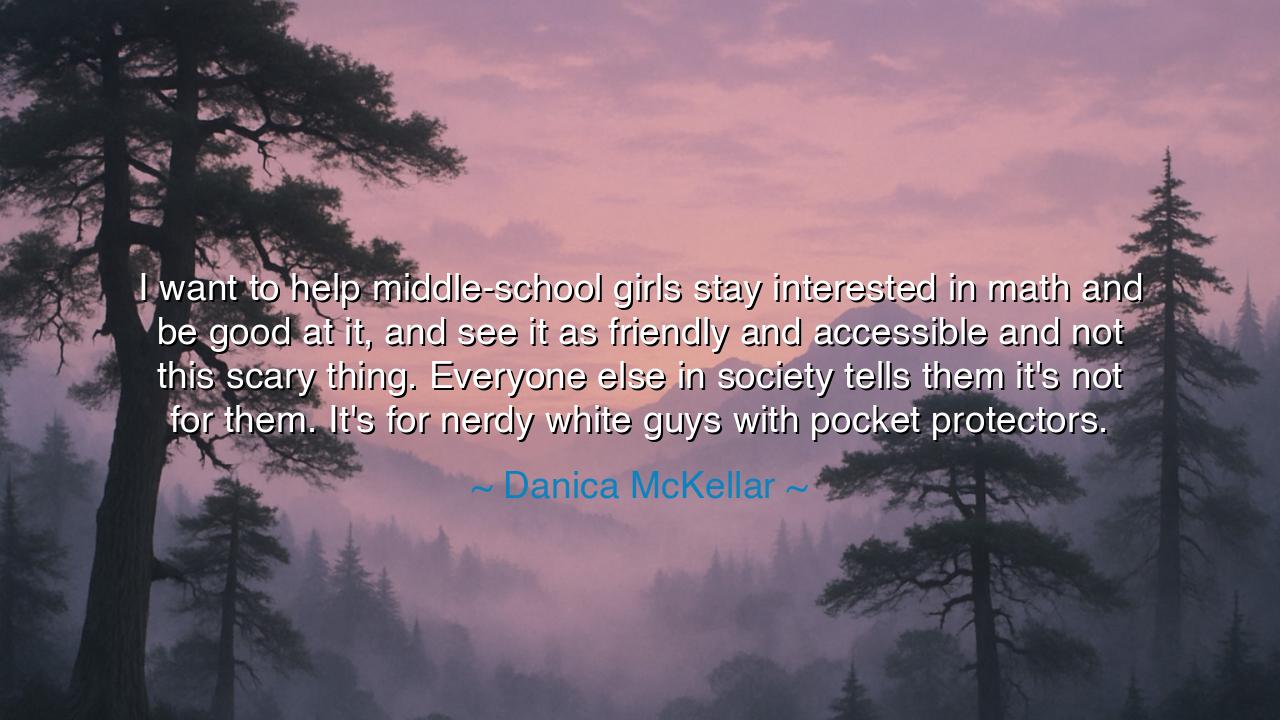
I want to help middle-school girls stay interested in math and
I want to help middle-school girls stay interested in math and be good at it, and see it as friendly and accessible and not this scary thing. Everyone else in society tells them it's not for them. It's for nerdy white guys with pocket protectors.






Danica McKellar once proclaimed, “I want to help middle-school girls stay interested in math and be good at it, and see it as friendly and accessible and not this scary thing. Everyone else in society tells them it’s not for them. It’s for nerdy white guys with pocket protectors.” Though spoken in the tongue of our age, these words carry the fire of an eternal truth: that knowledge is not the property of one people, nor of one gender, nor of one narrow image, but a divine inheritance given to all who dare to seek it. McKellar’s cry is not only for young girls, but for the soul of humanity, that no mind be barred from wisdom by the chains of prejudice or fear.
The ancients revered mathematics as sacred. Pythagoras spoke of numbers as the language of the cosmos, a song woven by the gods. To deny a soul access to that song is to silence part of their being. Yet across the centuries, women and girls were too often told that this music was not theirs to hear, that the scrolls of knowledge were locked away, reserved for men alone. McKellar, like a guardian at the gates of wisdom, stands against this injustice and declares that math is not an enemy, not a labyrinth of fear, but a friend—open, welcoming, and waiting to be embraced.
History bears witness to the tragedy of voices silenced. Consider the tale of Hypatia of Alexandria, a woman of brilliance who, in the fifth century, became one of the greatest mathematicians and philosophers of her time. She taught openly, she calculated the motions of the stars, she unraveled the mysteries of numbers. Yet society, bound by fear and envy, struck her down, reminding us how fragile progress is when prejudice reigns. Hypatia’s story warns us of the cost of telling half of humanity, “This knowledge is not for you.”
And yet there are also stories of triumph. Emmy Noether, a German mathematician of the twentieth century, shattered barriers by revealing the deep link between symmetry and the laws of physics. Her theorems underpin much of modern science, though in her time she was dismissed, excluded, and ignored because she was a woman. Her perseverance shows us that the path of math is not meant for one narrow image of humanity, but for all who seek truth. It is precisely McKellar’s mission: to ensure that the middle-school girl does not abandon her quest before it has even begun, misled by a world whispering falsehoods about who belongs.
The deeper meaning of McKellar’s words is this: fear is the true enemy, not mathematics. When society wraps math in cloaks of intimidation, when it whispers that only a certain type of person may grasp it, it drives away countless souls who might have discovered beauty, order, and freedom within it. But to present math as friendly—as a puzzle, a game, a language anyone can learn—is to open a door to empowerment. For the girl who conquers math learns not only equations, but courage; she learns that the world’s limits are lies, and that her mind is capable of reaching the heavens.
The lesson is clear. To teachers, parents, and mentors: you must tear down the walls of intimidation and present knowledge as a gift, not a threat. Speak of math not as a fortress but as a garden, where curiosity can play and grow. To young girls: do not believe the voices that say, “This is not for you.” Remember Hypatia, remember Noether, remember McKellar herself, who chose to wield her platform to defend your right to learn. And to society at large: guard against the poison of stereotypes, for each time we repeat them, we cast away another mind from the temple of wisdom.
Practical actions may be taken. Encourage the young to approach learning with joy, not fear. Give them role models who look like them, so they may know they belong. Celebrate effort, not just achievement, so that mistakes become stepping stones instead of walls. And above all, remind them daily that knowledge is the inheritance of all humanity, not the possession of a chosen few.
Thus McKellar’s words stand as a call to arms, though not with swords or shields, but with books, equations, and encouragement. “I want to help middle-school girls stay interested in math.” This is not only her mission, but one that belongs to us all. For when every child is free to embrace learning without fear, the world itself becomes wiser, stronger, and more radiant. And the stars, once distant, will shine more brightly for all.






AAdministratorAdministrator
Welcome, honored guests. Please leave a comment, we will respond soon